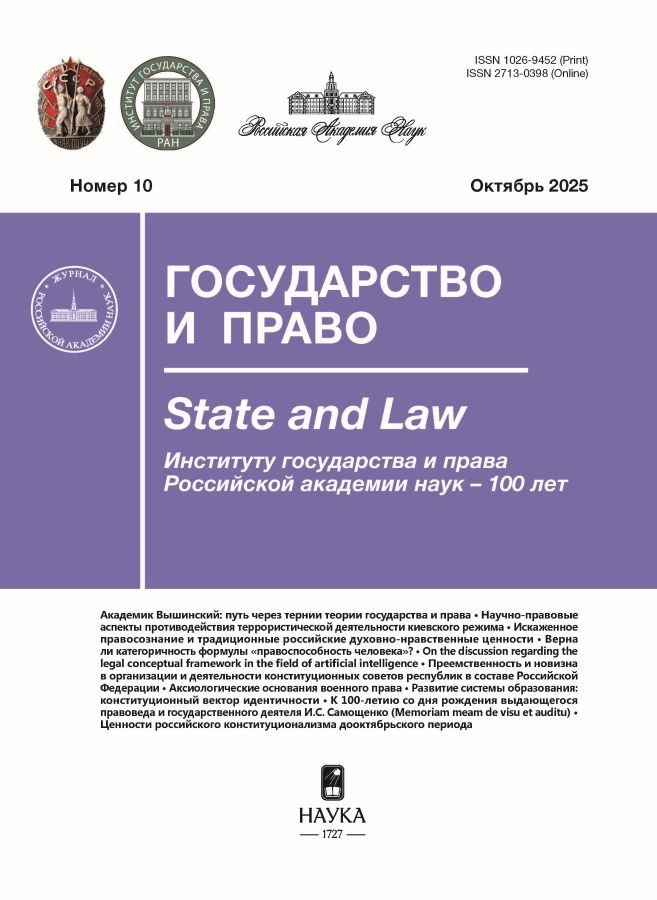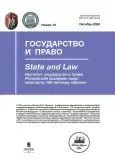Политика памяти в ЕС: осмысление колониального прошлого
- Авторы: Варламова Н.В.1
-
Учреждения:
- Институт государства и права Российской академии наук
- Выпуск: № 10 (2024)
- Страницы: 193-205
- Раздел: За рубежом
- URL: https://rjsvd.com/1026-9452/article/view/649082
- DOI: https://doi.org/10.31857/S1026945224100178
- ID: 649082
Цитировать
Полный текст
Аннотация
Сегодня политика исторической памяти перестает быть исключительной прерогативой национальных государств и активно разрабатывается как на транснациональном уровне, так и институтами гражданского общества, региональными и местными сообществами. В Европейском Союзе общая политика памяти является неотъемлемой частью интеграционного процесса и обеспечивает его легитимацию. При этом важно, чтобы в стремлении к укреплению европейской идентичности не искажались исторические факты и общему прошлому государств – членов ЕС давалась честная оценка. В статье рассматриваются проблемы осмысления в ЕС колониального прошлого Европы и используемые стратегии обращения с ним. Опыт проработки в ЕС этого сложного периода европейской истории и принятия его негативной оценки, несомненно, является полезным для других сообществ.
Ключевые слова
Полный текст
Об авторах
Наталия Владимировна Варламова
Институт государства и права Российской академии наук
Автор, ответственный за переписку.
Email: varlam_n@list.ru
кандидат юридических наук, доцент, ведущий научный сотрудник сектора прав человека
Россия, МоскваСписок литературы
- Asante S. K.B., Chanaiwa D. Pan-Africanism and Regional Integration // General History of Africa. Vol. VIII: Africa since 1935 / ed. by A. A. Mazrui, C. Wondji. Oxford, 1993. P. 740.
- East Central Europe Between the Colonial and the Postcolonial in the Twentieth Century / ed. by S. Huigen, D. Kołodziejczyk. Cham, 2023.
- Echoes of Empire: Memory, Identity and Colonial Legacies / ed. by K. Nicolaïdis, B. Sébe, G. Maas. London; New York, 2015.
- Garavini G. After Empires: European Integration, Decolonization, and the Challenge from the Global South, 1957–1986. Oxford, 2012.
- Hansen P., Jonsson S. Building Eurafrica: Reviving Colonialism through European Integration, 1920– 60 // Echoes of Empire: Memory, Identity and Colonial Legacies / ed. by K. Nicolaïdis, B. Sébe, G. Maas. London; New York, 2015. Pp. 209, 214, 215, 218, 219, 221.
- House of European History. Guidebook. Permanent Exhibition. Luxembourg, 2019. Pp. 29, 30.
- Huigen S., Emmer P., Kołodziejczyk D. Central Europe and Colonialism: Introduction // European Review. 2018. Vol. 26. No. 3. P. 407.
- Jeandesboz J., Pallister-Wilkins P. Crisis, Routine, Consolidation: The Politics of the Mediterranean Migration Crisis // Mediterranean Politics. 2016. Vol. 21. Iss. 2. Pp. 316–320.
- Lähdesmäki T. Founding Myths of EU Europe and the Workings of Power in the EU Heritage and History Initiatives // European Journal of Cultural Studies. 2019. Vol. 22. Iss. 5–6. P. 782.
- Langan M., Price S. Imperialisms Past and Present in EU Economic Relations with North Africa: Assessing the Deep and Comprehensive Free Trade Agreements // Interventions. International Journal of Postcolonial Studies. 2020. Vol. 22. Iss. 6. Pp. 703–721.
- Martin G. Africa and the Ideology of Eurafrica: Neo-Colonialism or Pan-Africanism? // The Journal of Modern African Studies. 1982. Vol. 20. No. 2. P. 229.
- Mullen S., Newman S. Slavery, Abolition and the University of Glasgow. Report and recommendations of the University of Glasgow History of Slavery Steering Committee. University of Glasgow. September 2018 // University of Glasgow. URL: https://www.gla.ac.uk/media/Media_607547_smxx.pdf (accessed: 25.08.2024).
- Nicolaïdis K. Southern Barbarians? A Post-Colonial Critique of EUniversalism // Echoes of Empire: Memory, Identity and Colonial Legacies / ed. by K. Nicolaïdis, B. Sébe, G. Maas. London; New York, 2015. Pp. 282–289, 293, 296, 299.
- Pace M., Roccu R. Imperial Pasts in the EU’s Approach to the Mediterranean // Interventions. International Journal of Postcolonial Studies. 2020. Vol. 22. Iss. 6. Pp. 671–673, 677, 679.
- Postcolonial Europe: Comparative Reflections After the Empires / ed. by L. Jensen, J. Suárez-Krabbe, Ch. Groes, Ch. Groes-Green, Z. Lee Pecic. London, 2017.
- Remembrance of Colonization and Decolonization. Interview with Gildas Riant, history and geography teacher, and member of CEREG // Chemins de MÉMOIRE. URL: https://www.cheminsdememoire.gouv.fr/en/remembrance-colonisation-and-decolonisation (accessed: 27.07.2024).
- Sierp А. EU Memory Politics and Europe’s Forgotten Colonial Past // Interventions. International Journal of Postcolonial Studies. 2020. Vol. 22. Iss. 6. Pp. 686, 687, 691–698, 700.
- Sierp A. Europeanising Memory: The European Union’s Politics of Memory // Handbook on the Politics of Memory / ed. by M. Mälksoo. Northampton, 2023. Pp. 81, 90, 91.
- Sierp A., Wüstenberg J. Linking the Local and the Transnational: Rethinking Memory Politics in Europe // Journal of Contemporary European Studies. 2015. Vol. 23. Iss. 3. P. 322.
- Swain H. Students Want their Curriculums Decolonised. Are Universities Listening? // The Guardian. URL: https://www.theguardian.com/education/2019/jan/30/students-want-their-curriculums-decolonised-are-universities-listening (accessed: 20.07.2024).
Дополнительные файлы











